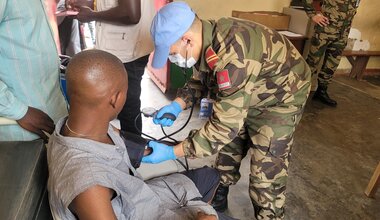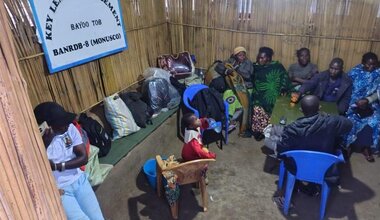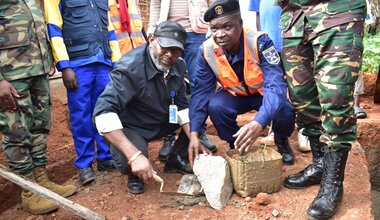Opening remarks at a press conference in Goma, DRC by UN Human Rights Office Field Operations Director Georgette Gagnon
25 August 2017
Good morning and thank you for joining us today.
Over the past week, I visited Kinshasa and Kananga before arriving yesterday morning in Goma. I am in the DRC in my capacity as director of the UN Human Rights Office’s 60 field presences, with a view to strengthening our engagement with the authorities and assessing the human rights situation during a particularly sensitive period for this country. I have met national and local authorities, military and civilian justice officials, civil society representatives, national human rights commissioners as well as victims and witnesses of human rights violations. I also visited a detention facility in Kananga and spoke to detainees.
The Democratic Republic of Congo is today in the midst of a number of crises – political, economic, humanitarian and human rights. With mounting uncertainty over the timing of the elections, increasing economic problems and attempts by the authorities to silence dissenting voices, the UN Human Rights Office is deeply concerned that the human rights situation is set to further deteriorate.
During my visit to Kananga, in Kasai Central, I heard first-hand accounts from victims of their families and neighbours being killed, their property looted, of forcible displacement as well as regular extortion by elements in the defence and security forces. These women, men and children have yet to receive any remedies or reparations, and the civilian and military justice systems have not been delivering. State authorities have an obligation to serve and protect the Congolese people. Recognition of the human rights abuses and violations the victims have experienced – whether the alleged perpetrators are members of armed groups or State security forces – is an important and necessary first step.
We call on the national authorities to put in place measures to stop the excessive and disproportionate use of force by the police and the army, and to ensure that those who commit violations of international human rights and humanitarian laws are held to account, regardless of their rank or affiliation.
As you are all aware, the UN Human Rights Council in June mandated a team of international experts to determine the facts and circumstances regarding recent human rights violations in the Kasais. The team is expected to arrive in the DRC in the coming weeks, with its secretariat to be based in Kananga. The team will work in an independent manner, in line with international standards and practice, to examine the allegations of gross violations and abuses committed by the militias and State security forces.
The space required for a credible electoral process is rapidly shrinking. So far this year, the UN Joint Human Rights Office had documented that 225 members of civil society organisations and 31 media workers have been victims of human rights violations. Here in Goma alone, 15 human rights defenders were arrested this year for participating in peaceful demonstrations.
The authorities – local, provincial and national – have a duty and a responsibility to ensure that the rights to freedom of expression, association and assembly are fully respected and that the exercise of these rights is facilitated – in accordance with the constitution of the DRC. Any allegations of threats or attacks against human rights defenders or journalists should be taken very seriously and measures taken to ensure they are able to carry on their crucial work without fear of reprisals. We urge the Government to pass a strong law that protects human rights defenders and the important work they do, in accordance with international standards. I also call on the Government to issue the law on demonstrations.
On behalf of the UN High Commissioner for Human Rights, I reiterate our continued support for victims of human rights violations in the DRC and reaffirm our 21-year-long partnership with the Government to advance the human rights agenda. For its part, we call on the authorities to ensure that adequate resources are allocated to military and civilian justice, as well as to national human rights institutions. We also call on the international community to continue to stay engaged on human rights issues in the DRC.
The many Congolese women and men we talked to during this visit shared their uncertainty for what is to come. If the multiple crises are not resolved in good faith, with transparency and the active participation of a wide range of actors, the consequences could be dire. The UN Human Rights Office calls on all sides to work to defuse tensions, and in particular on political leaders to show leadership, and to put the interests of the country and the human rights of Congolese people first.
ENDS
 UN
UN United Nations Peacekeeping
United Nations Peacekeeping






